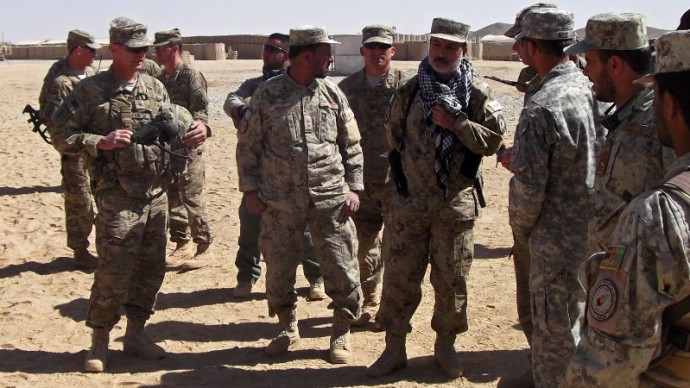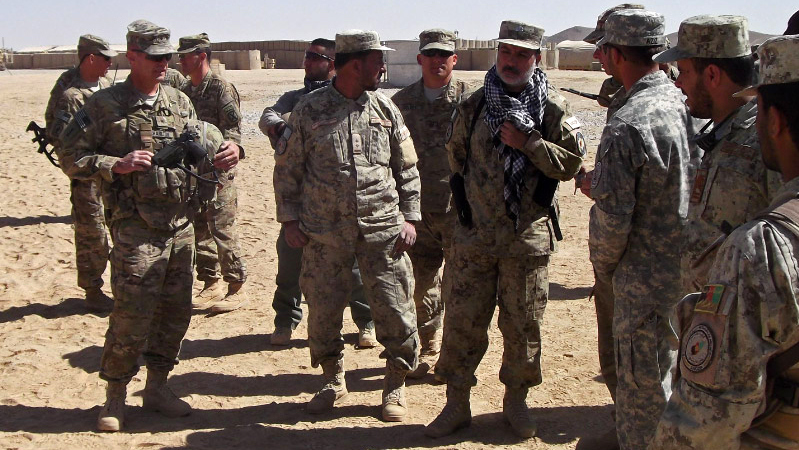
(NEW YORK) MintPress – After John F. Sopko was selected to serve as the Special Inspector General for Afghan Reconstruction (SIGAR) by President Obama in May of this year, he hit the ground running, actively combating corruption in the implementation of more than $89.5 billion taxpayer dollars provided to programs aimed at rebuilding the country.
In his latest move, Sopko called for immediate action to stop the disbursement of federal funds to several companies and individuals believed to be actively supporting the insurgency in Afghanistan.
Under Section 1229 of the National Defense Authorization Act (NDAA) for Fiscal Year 2008, the SIGAR is authorized to conduct independent audits, inspections and investigations in order to promote efficiency and effectiveness of reconstruction programs and to detect and prevent waste, fraud and abuses.
Sopko’s predecessor, however, failed to do so. Arnold Fields, who was appointed by President George W. Bush in June 2008, resigned in January 2011 after a review by the Council of Inspectors General found that many of his office’s audits barely met minimum quality standards and that he had not laid out a clear strategic vision.
Fields had commanded a Marine infantry battalion in Iraq during Operation Desert Storm and had a role in the reconstruction effort there.
The position remained vacant for more than 470 days before Sopko took over. He had been a partner at the Washington law firm Akin Gump Strauss Hauer & Feld since 2009, where he focused on congressional and federal investigations. Before that, he spent two years as chief counsel for oversight and investigations for the House Energy and Commerce committee. From 2005 to 2007 he was deputy director of the Homeland Security Studies & Analysis Institute.
Sopko began his career as a prosecutor in Dayton, Ohio, where he battled organized crime.
Widening the net
Earlier this month, he sent a letter to top U.S. diplomatic, military and U.S. Agency for International Development (USAID) officials informing them that in July, General James N. Mattis, Commander of the U.S. Central Command, had identified five entities and individuals as “actively supporting an insurgency” in Afghanistan. The letter said that in September, Mattis had identified another 20.
The general did so because Section 841 of the Fiscal Year 2012 NDAA, “Prohibition on contracting with the enemy in the United States Central Command theater of operations,” requires the commander to review recipients of U.S. contracts, grants and cooperative agreements with an estimated value exceeding $100,000 to determine if they are actively supporting an insurgency or otherwise opposing U.S. or coalition forces in a contingency operation.
The purpose of this identification, explained Sopko, “was to place Department of Defense (DoD) Heads of Contracting Activities (HCAs) on notice that they should take action to restrict the award of, terminate for default or void in whole or part as contrary to public policy, any contract, grant or cooperative agreement with these 20 individuals and entities.”
The problem, he continued, is that Section 841 affects only DoD contracts, so notice of the identification of active supporters of the insurgency in Afghanistan is provided only to DoD offices.
Sopko, on the other hand, wants a government-wide debarment of these individuals and entities and is working to ensure that Section 841 identifications are routinely shared with the State Department and USAID.
“We are aware that DoS and USAID use many of the same contractors as DoD or have the potential to use them in the future, possibly resulting in the award of contracts, grant or cooperative agreements to them in the period before their designation as excluded parties through the debarment process,” he wrote.
Legislative history
Congress inserted Section 841 into the 2012 NDAA because several government investigations have uncovered instances of U.S. taxpayer money being funneled to the enemy in Afghanistan, caused largely by weak oversight.
One year-long military-led investigation that ended in 2011 concluded that U.S. taxpayer money was indirectly funneled to the Taliban under a $2.16 billion transportation contract that the U.S. funded in part to promote Afghan businesses.
According to a summary of the investigation results, reviewed by the Washington Post, the military found “documented, credible evidence … of involvement in a criminal enterprise or support for the enemy” by four of the eight prime contractors.
Investigators also cited cases of profiteering, money laundering and kickbacks to Afghan power brokers, government officials and police officers. Six of the companies were found to have been associated with “fraudulent paperwork and behavior.”
“This goes beyond our comprehension,” said Rep. John Tierney (D-Mass.) at the time. He was the chairman of a House oversight subcommittee that charged that the military was, in effect, supporting a vast protection racket that paid insurgents and corrupt middlemen to ensure safe passage of the truck convoys that move U.S. military supplies across Afghanistan.
In his letter last week Sopko wrote, “Due to the issuance of this identification and authorization, an immediate need exists to alert DoS and USAID contracting officers and, by extension, your agencies’ prime contractors of the action taken by CENTCOM and the impact that it may have on their ability to contract or subcontract with the 20 contractors identified in General Mattis’s memoranda and their affiliate.”
So far, none of the companies and individuals named in the SIGAR letters have been suspended or debarred. One company, Zurmat Material Testing Laboratory, had a $20,000 contract terminated; otherwise, all of those companies and individuals who may be actively undermining the U.S. mission in Afghanistan are still eligible to receive U.S. taxpayer money.


